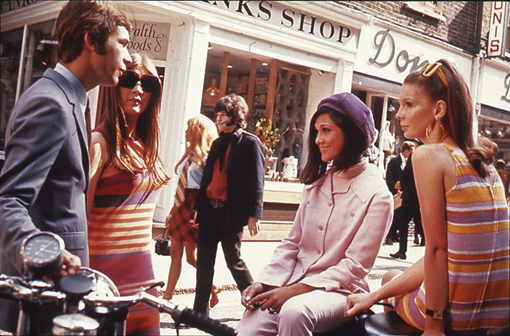Do you have memories of going to the cinema in Britain in the 1960s? If so, then the team running an AHRC-funded research project at University College London would love to hear from you. Here the project’s director, Dr Melvyn Stokes, and Research Associate, Dr Matthew Jones, explain why a study of 1960s cinema-going matters and how you can make a vitally important contribution.
As a baby-boomer myself, most of the early experiences of cinema I can recall were in the 1960s. So when, four years ago, I was asked to give a talk on cinema of the 1960s to UCL alumni who had graduated in that decade, I jumped at the chance. I spoke about both British and American films and showed a number of clips. I was surprised, at the end of the talk, when a large group of people clustered round to discuss not only the films I'd mentioned and others but also their personal memories of cinema-going in London in the 1960s. Many of the recollections were vivid, and particularly those dealing with the location of favourite cinemas, the rituals of going there and the people they went with. Having edited four books on audiences and reception for the British Film Institute, I was already interested in the history of cinema-going, but this experience made me realise that there are innumerable stories out there waiting to be told.
These so far unrecorded, personal histories of visiting the cinema are what the project is about. We'd like to discover how people remember film-going in the 1960s, not just in London but in the country as a whole. (Many of my own memories of the time relate to going to the cinema in my Yorkshire hometown of Wakefield and seaside resorts such as Bridlington.) We don't care about people's background, or what jobs they had or their type of education -- it's the memories that count for us.
Why focus on the sixties? Mostly because the sixties have a reputation as a time of great change -- in fashion and morals (Carnaby Street, Mary Quant, the Profumo case and 'swinging London'), music (the Beatles and Rolling Stones, among many others), law (the legalisation of abortion and homosexual adult relationships, both in 1967) and politics (the first Labour government since 1951). But was it really a decade of radical change? We think that people's memories of the films they saw and whether or not they tapped into the experiences of their own lives will shed a lot of light. Many writers on cinema have regarded films as emblematic, embodying many of a society's hopes, myths, fears and fantasies. We have no idea if that is true or not of cinema in sixties Britain, but hope perhaps to find out.
Did people prefer British or Americans films? Who were the stars they liked or disliked? What types of film did they really prefer? Who did they go to watch films with? Parents, friends, dates (a social survey in 1965 suggested that over half of all young people went to a cinema on a first date) or children? What do they remember of the cinema-going experience itself? Did they or people around them smoke? Did they talk during performances? Did they eat or drink? Was there a regular night (or nights) when people went to the cinema? By answering questions such as these, our contributors are helping us build up a detailed picture of cinema-going in 1960s Britain.
Matthew Jones:
Memory is a curious, slippery thing. I’m a little too young to have been in the cinema in the 1960s myself, but when I think back to my early experiences of cinema-going in Derbyshire in the late 1980s and early 90s, what stands out isn’t necessarily the films I watched or the buildings I saw them in (though I do recall details of both). The most important thing to me has always been the fact that my grandparents were the people who were most often sat next to me in the auditorium. But can I be sure that this is really true? It is entirely possible, I suppose, that I have privileged these memories precisely because I now share a love of film with my grandmother and this has become a key part of how I understand my relationship with her. Memory doesn’t necessarily provide us with facts, after all, but with a construction of reality filtered through years of intervening experiences.
It doesn’t matter whether you have precise recollections of specific events or just a general, foggy sense of what the cinema was like in sixties Britain. Many of our contributors fall somewhere between the two, but we are interested in whatever you have to offer.
In the first instance, we would encourage anyone who has memories they would like to tell us about to complete a questionnaire that we have made available on our website and which can also be provided on paper. Details of how to do this are at the end of this article. We are hoping to use this questionnaire to collect the memories of a cross-section of British society, including people from every background and walk of life. After using this information to provide a broad but detailed account of the nation’s cinema-going memories, habits and experiences, we will then be exploring particular areas in more detail by conducting oral history interviews and focus groups with volunteers.
However, it isn’t our intention to keep these memories to ourselves. Instead, we think that the collection of material we are developing will provide crucial evidence for historians both of modern Britain and of the cinema. As such, we are offering each participant the opportunity to decide whether they want their memories to remain confidential, or whether they would like them to be made publicly available, in an anonymised form, in a research library at the end of the project. In this way we hope to build a significant resource for future scholars and the general public, opening up this aspect of the 1960s like never before.
We are also using the project to encourage people across the country to remember their own cinema-going histories and to reconsider the importance of these experiences to them. To do this we are taking the project on the road, visiting villages, towns and cities in all areas of the United Kingdom. In each location that we visit, we will be introducing and screening a 1960s film and encouraging the audience to discuss their memories of either the era of or their own cinema-going habits. Details of these events will be placed on the project website as they become available and we would particularly encourage any cinemas or film clubs and societies that are interested in hosting a screening to get in touch.
If you're interested in sharing your memories of 1960s cinema-going, please visit www.ucl.ac.uk/cinemamemories. The project's questionnaire is available on the website, or you can also request a paper copy and a freepost return envelope by contacting Melvyn and Matthew in the following ways:
Post: British Cinema-going Project, History Department, University College London, Gower Street, London, WC1E 6BT. Telephone: 020 7679 7960 Email: cinemamemories@ucl.ac.uk Twitter: @MWillJones Support the project: Contribute your memories (link to questionnaire)

